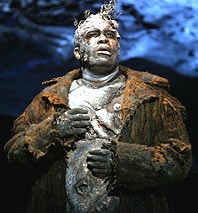It was decades in the making, and had a shaky opening in early June in Los Angeles, but composer Elliot Goldenthal’s Grendel, directed by his longtime partner, Julie Taymor (best known for Broadway’s The Lion King), is finally onstage. It’s the first opera by the Grammy-, Tony-, Emmy-, and Oscar-nominated Brooklyn native. Based on John Gardner’s 1971 novella and on “Beowulf”, the opera is told from the monster’s perspective (Eric Owens, pictured, sings the role), and it arrives at the Lincoln Center Festival on July 11. The couple spoke with Alicia Zuckerman.

What took this work so long to get to stage?
J.T.: Elliot and I both read “Grendel” in the seventies. We really started to conceive this in 1985 or ’86, and Elliot wrote the first scene, a solo aria for Grendel and a choral piece. It took many years, because to get a commission is a very big deal in the U.S.
E.G.: Very often we had one party interested, and then another, but then they’d get fired. That happened many times. So I put the opera in a drawer until three years ago.
You’ve said that this story is more relevant now than when Gardner wrote the novella.
It starts with the outsider looking at human beings from the outsider point of view, but the monster is the most human of humans. It talks directly to what’s going on right now – our fear of terror, our fear of the outsider, of the immigrant, our need to create an enemy.
When Grendel says, “This is the twelfth year of my idiotic war,” with such revulsion and boredom – it’s ridiculous, mindless, almost mechanical, that these things are happening over and over again. When Gardner wrote this, it was about the sixth year of Vietnam.
[But] to do something direct and political – it’s nonsense, it’s silly. What is powerful about work that’s mythic is that you can get a great story, like a good Shakespeare play. We don’t want people to think, Oh, we’re gonna come to some political crap. No, no.
Elliot, when you fell and hit your head in December, you lost your ability to speak for months. And this play is about Grendel’s isolation …
I pretty much identified with that anyway. [Before the accident] I finished the first act and part of the first scene in the second act, but I had a huge way to go. It took me about a month to get back into it, then everything flowed, everything from fifteen years ago.
How do you think you got it back so readily?
Probably more than anything? Deadline.
It was all there ready to come out. And with the fall, which is unfortunately metaphoric for what happened in the opera, he didn’t lose any creativity whatsoever.
I wouldn’t recommend it.
Did you work together before you became a couple?
Five years.
There’s twenty years of trust involved. I made a point not to play the opera for Julie during this three-year creation period because I know that Julie’s comments will be very persuasive, and accurate – perhaps – but it would derail my original feelings. And she waited, up until practically a month before rehearsal.
We got everything going, but it’s not that easy to design a whole opera without hearing the music. The real directorial work was done in the five weeks of rehearsal. We had very little tech time because we had some problems – those mechanical set problems, which people have written about ad nauseam.
Yeah, I’ve been warned that you don’t like talking about that. But it’s hard to ignore a $300,000 setback.
Yeah, well, George Tsypin [the set designer] and I were ambitious. We found this one [chuckles] “simple set piece” that had to do a lot of things – and it does, and it works beautifully now. This is a very fully theatrical opera, as opera should be.
Did you have trouble with the L.A. Opera itself? When they revived your Flying Dutchman, I know, they cut some special effects to save money, and you weren’t happy.
[Laughing] Listen, Elliot and I – we go where they want to produce the opera. I don’t think they would ever do that with Grendel. It would be weird to shortchange it. [But] I don’t want it to rest on my production alone.
And it can be taken out of an opera house, in a film form.
I would love to shoot this for film!
Speaking of film, tell me about “Across the Universe”, the Beatles project you’re working on.
It takes 32 Beatles songs and tells an original story – a love story set during this incredible turmoil and passion and the psychedelic mind-exploration part of the sixties.
And all the music had to be rearranged completely. That is a heavy task – they’re so iconic.
That’s quite an interweaving of cultures.
It was like, ‘It’s eight o’clock, I’m leaving Grendel now – time to do rock and roll’. Thank God for rock and roll!